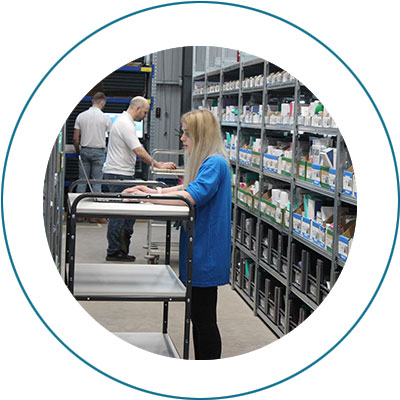The difference between a DAC and a pharmacy
Patient Choice is a Dispensing Appliance Contractor. We can be nominated to dispense prescriptions for a wide range of appliances, devices and accessories. But how do we differ from a pharmacy? There are many similarities, and this page explains the differences and roles.
A pharmacy primarily focuses on dispensing medications and providing pharmaceutical services, while a Dispensing Appliance Contractor specialises in supplying medical appliances prescribed by healthcare professionals for specific medical needs.
In the UK, a pharmacy and a dispensing appliance contractor are two different entities involved in the provision of pharmaceutical services, but they serve distinct functions in the healthcare system.

Dispensing Appliance Contractors (DAC)
A Dispensing Appliance Contractor (DAC) is a specialised supplier of medical appliances and devices, particularly those used in the treatment of long-term medical conditions or disabilities.
Unlike pharmacies, DACs do not typically dispense medications. Instead, our focus is on providing various medical appliances that aid in the treatment and management of specific health issues. These appliances can include items like stoma bags, incontinence products, wound dressings, compression garments, and other medical aids. DACs work closely with the National Health Service (NHS) and healthcare professionals to supply these appliances to patients who require them.
The key functions of a Dispensing Appliance Contractor such as Patient Choice include:
- Dispensing medical appliances: DACs supply specialist medical appliances and devices to patients, ensuring they have access to the appropriate equipment to manage their medical conditions.
- Liaising with healthcare professionals: DACs work in collaboration with healthcare professionals, such as doctors and nurses, to ensure that patients receive the correct type and quantity of medical appliances they need.
- Home delivery service: Many DACs – including Patient Choice – offer a home delivery service, delivering the medical appliances directly to patients’ homes to ensure convenience and continuity of care.
Pharmacies
A pharmacy – often referred to as a community pharmacy, retail pharmacy or chemist – is a healthcare facility where prescription and over-the-counter medicines are dispensed to the public. It is often a retail outlet located in the high street, within hospitals or within GP surgeries where people can obtain medications, health products, and professional advice from pharmacists. Pharmacies play an increasingly crucial role in providing accessible and convenient pharmaceutical services to patients and the general public.
Key functions of a pharmacy include:
- Dispensing prescription medications: Pharmacists at the pharmacy review prescriptions from doctors or other healthcare professionals and dispense the appropriate medications to patients.
- Over-the-counter medication supply: Pharmacies offer a range of non-prescription medications and health products that can be purchased without a prescription.
- Patient counselling: Pharmacists provide advice and information to patients regarding the proper use of medications, potential side effects, and drug interactions.
- Medication management services: Some pharmacies may offer additional services, such as medication reviews, medication synchronisation, and compliance aids to help patients manage their medications effectively.
- Emergency contraception: Pharmacies may offer emergency contraception, also known as the morning-after pill, directly to patients after a consultation with the pharmacist.
Some pharmacies may also be registered as DACs, allowing them to provide both pharmaceutical services and dispense medical appliances.




